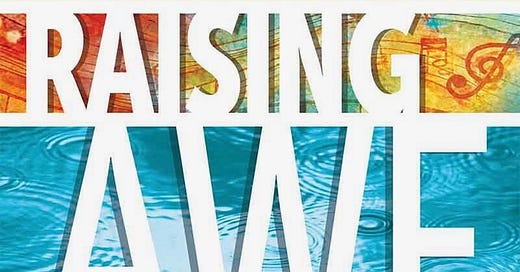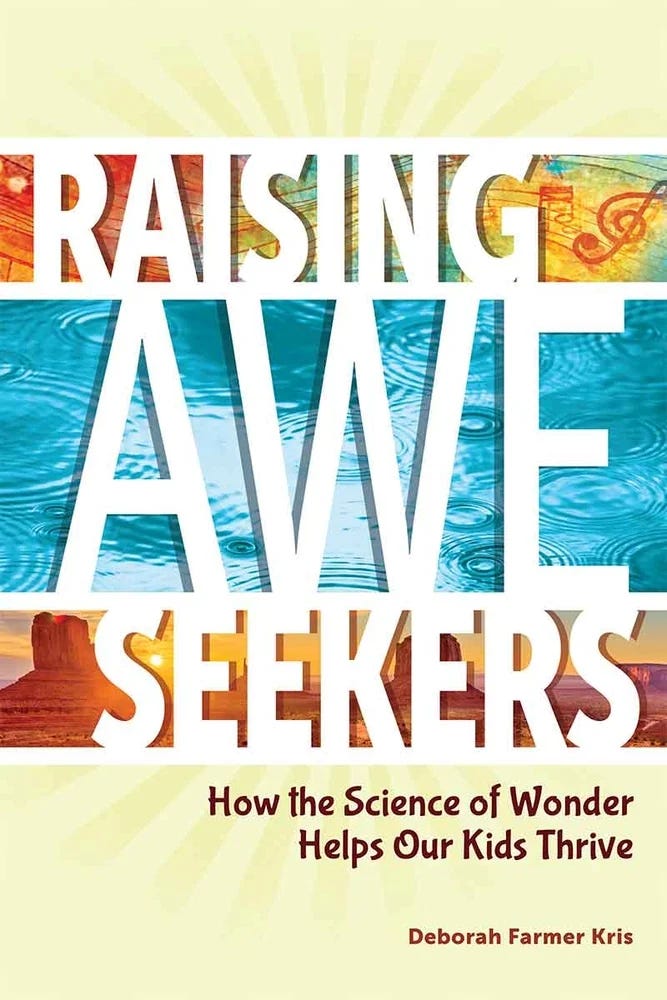Parenting to Foster Awe
A Q&A with Deborah Farmer Kris on the power of awe — and how to nurture it
My new book, Hello, Cruel World!, shares a book birthday with another very special parenting book: Raising Awe-Seekers: How the Science of Wonder Helps Our Kids Thrive, by child development expert Deborah Farmer Kris.
When Deborah (who has also written a number of wonderful children’s books) first alerted me to this news several months ago, I was very excited. I think it’s so important for us as parents to step away from fear and anxiety and toward hope and wonder, and Raising Awe-Seekers is a book that helps us do just that. It’s an inspiring, science-based read, full of smart yet simple tips to nurture awe in our children’s lives.
I spoke with Deborah about the inspiration for her book, the importance of awe, and why fostering it in our kids can actually make our lives easier. I hope you enjoy our Q&A and I encourage to purchase her book, too. It’s a quick and delightful read, one I am very glad I have on my bookshelf.
Deborah, what inspired you to write Raising Awe Seekers?
Mary Oliver once said in an interview, “I got saved by the beauty of the world.” That’s how it’s felt working on this book for the last four years.
The origin story goes back to fall of 2021 (you know, that fall — the one where you instituted the mom’s primal scream, Melinda?). A school asked me to give a workshop on “stress and resilience” — and something in me just snapped. I was so sick of talking about stress and resilience!I literally sat in my little home office and had dialogue with myself:
My Brain: What do you really want to talk about, Deborah?
Also My Brain: I want to talk about . . . . hope?
A couple of weeks later, I stumbled across a 45-page white paper summarizing two decades of research on awe — and I was gobsmacked. I called the lead researcher, Dacher Keltner, and wrote an article about kids and awe for the Washington Post that went viral. And I knew I wasn’t done with the topic, because it was feeding ME. Hence, this book. I would gladly spend the rest of my life seeking awe and wonder and helping kids and parents do the same.
What are some of the benefits of awe, and why is it so important that we help our kids experience it? How does it relate to how children connect to others and the world around them — things like compassion and activism?
You are speaking my language. Awe has so many correlated benefits. It prompts us to be kinder, more cooperative, and more willing to share with others. It supports mental health and can reduce biomarkers of stress and inflammation. It even supports academic engagement. Because awe is so tied to the senses — what we see and hear and touch — it helps us stay grounded in the moment, to zoom out from our mental chatter and zoom into the here-and-now.
Getting out of our heads helps us connect to the rest of the world. Here’s one of my favorite studies about that. The Berkeley campus has this grove of eucalyptus trees. Researchers took a set of volunteers outside — one at a time — and asked them to stand and gaze at the towering trees. Then they asked another set of participants to stand in the same spot — but to direct their gaze at the back of the campus science building.
After each participant had spent some time staring at one view or the other, a “stranger” walked by, stumbled, and “accidentally” dropped some pens to the ground. The tree-gazing participants picked up more pens than their building-gazing counterparts. They noticed a stranger’s need. They helped. Instead of focusing inward, they reached outward.
When I describe this study to teens they really respond to it. And I wonder if that’s because of the metaphor tucked inside: Two people -- standing in the exact same place — can feel uninspired or awestruck depending on where they direct their gaze. We can't always choose the spot we stand in — literally and metaphorically. But moments of wonder can help reframe our perceptions.
Can you talk a bit about the relationship between awe, curiosity, intellectual humility, and learning?
Oh, there’s so much here! Can I direct your readers to an excerpt from the book that was published in MindShift? But the short answer is this: Awe spurs our curiosity. Kids see something that makes their eyes grow wide and they want to know more. They want to ask “Why?” One study of teenagers found that “The more awe they felt, the more curiosity they expressed and the better they performed in school.” And it makes sense, right? When kids are curious about a topic, they are motivated to learn.
Is awe becoming a more elusive emotion? Is there evidence to suggest that we (or our kids) are feeling less wonder less today than we did in the past? If so, why?
In his book “Awe,” Dacher Keltner makes a strong argument that today’s children are “awe-deprived.” Why? Well, that goes back to the sources of awe: nature, music, art, community, big ideas, and witnessing human kindness and courage. Children, in general, spend less time in nature. Art and music budgets are usually the first things slashed in public schools. Test-driven education doesn’t always make room for children’s passions. And let’s face it, the pandemic took a toll on our communities — on people engaging in their towns, cities, neighborhoods, etc.
In addition, awe requires slowing down and paying attention — “wandering without aim” as Keltner told me. And our child-rearing culture is too often driven by anxiety and the pressure to achieve, to get ahead, to set kids up for success, to build the college resume starting in middle school. So I’m hoping that this book offers a gentle course correction — an inspiration to, well, slow down and pay attention to this beautiful world all around us.
I imagine some parents might be reading this and worrying that now they have one more thing to add to their endless to-do lists: ensure that their kids experience awe. Are there ways to encourage awe and wonder in our kids that actually involve stepping back and doing less as a parent?
YES! First, strike the idea that you need to “ensure that your kids experience awe.” Because we cannot control their emotions or reactions. What I love about awe is that it’s found in the ordinary, in the simple: a beautiful sunset, a song that gives us goosebumps, meeting the neighbor’s new puppy, cheering in the stands for your favorite team, an unexpected kindness from a stranger. So it’s not about teeing up these grand experiences. In fact, your five-year-old might find the Grand Canyon less awe-inspiring than watching a bunch of ants decimate a marshmallow.
My primary goal is also my best advice: to be an awe-seeker, yourself. To take a deep breath and try to find something beautiful every day — the way your kid’s face lights up when the dog licks it in the morning or the smell of your neighbor’s lilacs. And then, to take it one step further, to sometimes share this with your kids. To let them see what lights you up; to pay close attention to what sparks their wonder.
How has writing this book changed you as a parent?
Writing Raising Awe-Seekers has involved the best kind of soul searching — including tuning into the part of myself that isn’t a mom! As I wrote about each source of awe, I had to ask myself: what art and music gives me goosebumps? What is it about nature that makes me say “wow”? Where am I finding community? How am I tuning into human goodness — as opposed to doom scrolling? Because I am a better parent when I am more in touch with . . . ME!
I often think about a scene in the movie Runaway Bride where Richard Gere asks Julia Roberts how she likes her eggs. She realizes she doesn’t know. She has “liked” them however each of her successive fiances has liked their eggs. Oof.
Like Julia’s character, there was this point when my kids were about 8 and 11 when I realized I didn’t know what music I liked anymore! I had spent so many years in the car listening to my kids’ music. And then, when I started to relisten to my old favorites, they just didn’t hit the same way.
My teenager is the one who stepped in to save the day on this one: she told me to get a Spotify account and taught me how to use it. She suggested a few new artists I might like and encouraged me to explore. She did exactly what I hope to do as a parent: she gave me a practical tool and then encouraged me to go figure it out myself! She pushed me to be an awe seeker.









Great interview with good advice from an expert awe-seeker. Thank you.
Love this! Looking forward to reading the book. I enjoyed Keltner’s book on awe, too. Wandering without aim, slowing down, feeling all the senses in nature—this is at the core of my practice as a playworker and a spirit-changing way to go through life. Thanks for this discussion!